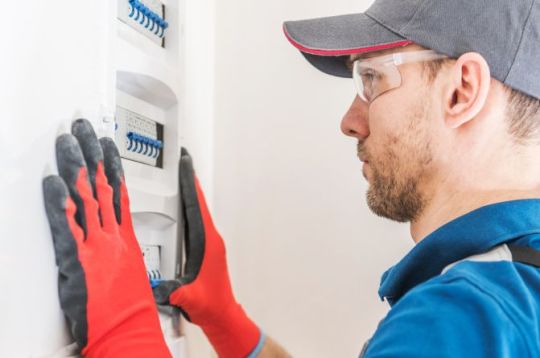
When you hire an electrician to do work on your home, make sure they are licensed and issue a Certificate of Compliance for their work. While you can do a limited amount of electrical work on your own home, unless you are sufficiently skilled, it is much better to get an electrician to undertake the work.
WorkSafe administers the principal laws governing electrical work in New Zealand. These are:
The law allows homeowners to do a limited amount of electrical work in their home.
Any person other than a homeowner who carries out prescribed electrical work is required to be registered by the Electrical Workers Registration Board (EWRB). All electrical workers who carry out electrical work in return for payment or reward must hold an annual practising licence.
When you contract an electrical worker always ask to see their practising licence and check the expiry date. This is proof that the worker is qualified to do electrical work safely.
Note: the colour of the licence changes every two years. If you are unsure if your electrical worker is licensed get in touch with the EWRB
Certificate of Compliance (CoC)
Electricians must issue a Certificate of Compliance (CoC) to customers when doing any fixed wiring work, including fitting new power points. CoCs are not issued for maintenance work, such as replacing sockets and light fittings or repairing appliances.
The CoC indicates that the work done is electrically safe and has been carried out in accordance with New Zealand’s electrical safety standards and codes. It also shows they have tested their work once completed.
Keep your CoC in a safe place as a record of the work done on your property. It is an important document and may be required for insurance claims or when you are selling your home.
A CoC guarantees that the work:
- has been completed by a licensed electrician
- meets safety standards set by law, and
- has been tested.
Electrical safety inspections
The law also requires some electrical work to be inspected, particularly work on the main switchboard, the main cable, and the main earth. The electrician you employ is responsible for arranging for a licensed electrical inspector to carry out the inspection. Keep the inspection report with your CoCs, a copy of this guide and other important information.
If you have any concerns about your home being electrically safe, have it checked by a licensed electrical inspector.
Buying a home
Before buying a home, get a licensed electrician or inspector to verify that all installations, outbuildings and electrical equipment are electrically safe. They can also identify any electrical problems you may face in the future.
Ask the vendor about all the electrical work undertaken and sight all CoCs. This acts as an assurance that a licensed electrical worker has performed the job safely. The CoC is also important for liability and insurance purposes, should something go wrong.
Building or renovating a home
When building a new home or renovating an existing one, plan for your present electrical needs and for what you may need in the future. Make sure you have adequate power points and fittings and ask your electrical worker to advise you of the latest electrical safety devices available.
Although you may have to spend a little more up front, it may save a life in the future.
Your rights – How to complain about sub-standard or unsafe electrical work
If you have a problem with electrical work done in your home, first discuss it with the electrical worker or company who did the job. If you are still unhappy, you can lay a formal complaint with the EWRB. For more information about making a formal complaint, contact the EWRB at 0800 66 10 00 or check their website at www.ewrb.govt.nz
Article First Appeared On https://worksafe.govt.nz/managing-health-and-safety/consumers/safe-living-with-electricity/getting-electrical-work-done/
Getting electrical work done syndicated from https://rotoruaelectrical.tumblr.com
from
https://croftscorner.wordpress.com/2019/11/02/getting-electrical-work-done/
No comments:
Post a Comment